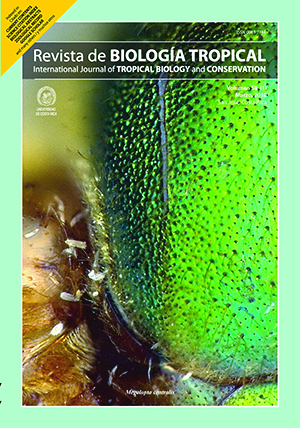Resumen
La larva de Hypsipyla grandella (Zeller) es quizás la principal plaga forestal en América Latina y el Caribe, por perforar el brote principal de árboles de maderas preciosas, como caobas (Swietenia spp.) y cedros (Cedrela spp.). En la búsqueda de un método preventivo para su manejo, se estudió la actividad fagodisuasiva del extracto crudo y de cuatro particiones fitoquímicas (agua, hexano, diclorometano y acetato de etilo) del follaje de ruda (Ruta chalepensis L.). Se realizaron bioensayos de laboratorio con concentraciones crecientes del extracto crudo (0.1; 0.32; 1.0; 3.20 y 10.0%m/v) y con cada una de las particiones (según el rendimiento del proceso de particionamiento), así como con el glicósido flavónico rutina. Para ello se empleó un diseño de bloques completamente al azar, con cuatro repeticiones y se expusieron larvas de instar III de H. grandella a discos de cedro (Cedrela odorata) impregnados con el respectivo tratamiento, por 24h. Se midió el porcentaje de consumo de cada disco. Hubo un fuerte efecto fagodisuasivo en el extracto crudo y en la partición hexano, a concentraciones tan bajas como 0.32% y 0.074% m/v, respectivamente; las particiones de acetato de etilo (0.24%m/v) y la acuosa (en todas sus concentraciones), así como la rutina (a partir del 0.064%m/v) también causaron fagodisuasión. Además, se realizó un tamizaje fitoquímico del extracto crudo, utilizando varias pruebas cualitativas para detectar la presencia de los principales grupos de metabolitos secundarios, entre los cuales los más importantes fueron alcaloides, triterpenos, cumarinas y la rutina. Asimismo, se realizó una marcha fitoquímica a la partición hexano, por ser la más activa.
Esta obra está bajo una licencia internacional Creative Commons Atribución 4.0.
Derechos de autor 2010 Revista de Biología Tropical
Descargas
Los datos de descargas todavía no están disponibles.

